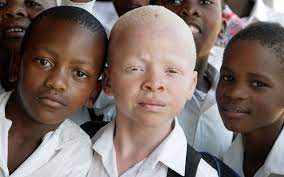Today, Nigeria joins the rest of the world to observe the International Albinism Awareness Day (AIID). The day was proclaimed on December 18, 2014 vide the General Assembly resolution A/RES/69/170, while the maiden celebration was observed on June 13, 2015. Earlier in 2013, the United Nations Human Rights Council (UNHRC) had adopted a resolution calling for the prevention of attacks and discrimination against persons with albinism.
The theme for this year’s commemoration is: “10 Years of AIID: A Decade of Collective Progress”. The themeis carefully chosen to celebrate the achievements and successes of persons with albinism worldwide in the past decade. It is also a call to stand in solidarity with people with albinism through their challenges and to recognise their accomplishments in spite of all odds.
Albinism is caused by a defect or complete absence of an enzyme which produces melanin. Melanin is what gives hair, skin, and eyes their pigmentation. This lack of skin pigmentation makes the person much more susceptible to skin cancer and damage from the sun (a problem especially bad for those living in Africa). Albinism is a global phenomenon. It exists even in the animal kingdom.
It is a well-known fact that people with albinism have been facing hurdles and challenges that seriously undermine their access to human rights. These range from stigma and discrimination to barrier in health, education, employment, etc.
According to available statistics, out of every 12,000 persons globally, one is an albino. Albinos are classified among the vulnerable groups of society, which include people living with various kinds of physical disabilities.
Albinism is prevalent in Africa. Nigeria is home toover 600,000 albinos. They suffer discrimination from their families, schoolmates and peers. Some families practise infanticide on babies born with albinism in the erroneous belief that they are evil and that their education is a waste of investment. To the contrary, albinos can be as brilliant as any other human being despite their dermatological challenges.
On the African continent, Tanzania is ranked as the leading country in East Africa where people living with albinism have become endangered species. In that country, albinos are hunted down like game so that their body parts can be used by witchdoctors for all manner of rituals. In other words, albinos are negatively used as elements to generate wealth. Albino body parts are highly prized in those circles. The limbs fetch a hefty price ranging from $2,000 to $3,000 per limb, and often the heads of albino people are hung on totem poles as good luck charms.
Many are also of the belief that albinism is a curse and may even be contagious. This makes them easy targets for witchdoctors and limb-hunters in that part of Africa
Besides the mission for money, albinos are harvested for other purposes. Tanzanian traditional healers and witchdoctors consider the body parts of people with albinism as being essential to their magical recipes for those seeking political powers. Many Tanzanians, Kenyans and Burundians living with HIV/AIDS have been known to capture young albino girls, trusting that raping them could help to cure their afflictions. Fishermen pay hawkers in the belief that albino parts would jazz up their fishing nets and attract better hauls.Men in that axis are also known to lure albinos into marriage with the ultimate aim of murdering them for ritual purposes.
The inhuman and primitive culture that is deeply rooted in East Africa was practised in Nigeria some years back whenan albino woman was beheaded in Ilorin ostensibly for money or good luck charms.
Scared of the worrisome development, the founder of the Albino Foundation of Nigeria (AFN), Mr. Jake Ekpele, raised an alarm during the maiden 2015 UN celebration of the World Albinism Day and called on the government to protect his members from predators who harvest them for ritual purposes.
A bill to establish a National Agency of Albinism passed the second reading at the House of Representatives in 2017 or thereabouts. Nothing has been heard about the effort again. The Bill, sponsored by Rep Linus Okorie, should be revisited. When passed into law, the safety and wellbeing of folks living with albinism will be fully taken care of. People with albinism are human beings like the rest of us. They deserve all the support they can get, including medicare to safeguard their sensitive skins and dark goggles to shield their eyes from sunlight.
We all should stand strong in love and in protection of the albinos in our midst. Albinism is not contagious and as such, those living with the condition should not be stigmatised or discriminated against. Those who ritualise them for money, political supremacy or any other purposes outside the will of their Creator deserve to be paid back in their own coins




